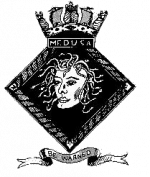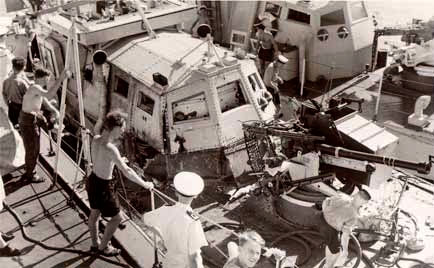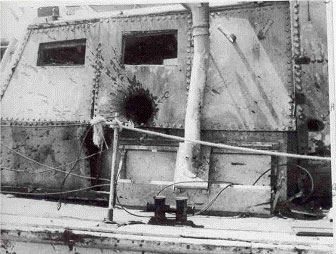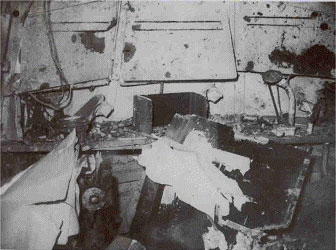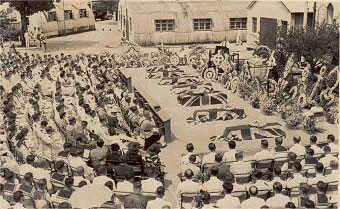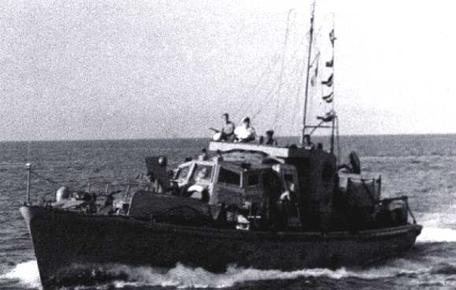HDML 1323
A McFarlane & Son, Birkenhead, Adelaide, Australia 21/1/44
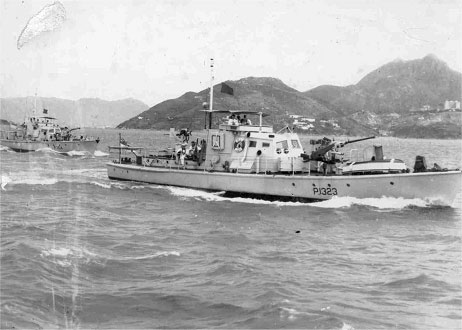
London Gazette 23/3/54 – Good service when attacked by Chinese pirates in the Pearl river 9th September 1953
- BEM LSea Gordon Richard Cleaver P/SSX857298
- Comm StoM Eric Milner P/SKX841644
- Comm AB Ralph Shearman D/JX842871 (Post)
Known Crew
- Lt J S L Stevens RANVR Lt 24/12/40 HDML 1125 9/43 Commanding Officer HDML 1323 8/12/43 HDML 1342
- Lt A B Clough RANR HDML 1161 1/43 HDML 1343 6/44 129th Flotilla Based on Darwin HDML 1323 9/44 ML 824 12/44
- TLt Leo Dominic McHugh RNR Prob TSLt HMS Cricket (gunboat) 28/6/40 TLt 28/9/40 HMS Aberdare (minesweeper 1/2/41 HMAS Themistocles [HMAS Rushcutter (RAN base, Sydney, NSW)] 15/6/42 HMAS Maitland (RAN base, Newcastle, NSW) (for examination service) 13/7/42 HMAS Maitland (RAN base, Newcastle, NSW) (for Naval Control Service) HMAS Magnetic (RAN base, Townsville) 1/6/43, HMAS Platypus (RAN base, Cairns & Thursday Island) (as Naval Control Service Officer and Sea Transport Officer, Augusta) 1/10/43 Commanding Officer HDML 1323 13/8/44 HMAS Magnetic (RAN base, Townsville)] (as Naval Control Service Officer and Sea Transport Officer, Merauke) 9/44 HMAS Moreton (RAN base, Brisbane) (for Naval Control Service) 13/10/44 HMAS Melville (RAN base, Darwin) (additional; for Naval Control Servie) 4/45 HMAS Rushcutter (RAN base, Sydney, NSW) (additional; for release) 17/12/45
- SLt G E Tassicker RANVR SLt 1/8/41 ML 803 6/43 HDML 1323 Lt 1/2/44 HMS Rushcutter (RAN base, Sydney, NSW)
- SLt G S Grace RANVR SLt 5/6/42 HDML 1161 1/43 ML 813 2/43 ML 811 First Lieutenant HDML 1323 7/44
- SLt R F Smith RANR SLt 1/10/44 HDML 1323
- ASLt M M Sim RANVR HDML 1323 9/43
- SLt Hamilton G Cooper RANR SLt 25/5/44 HDML 1322 10/44 HDML 1323 ML 809 4/45
Hong Kong Flotilla
- Rodney Berger (Commanding Officer)
- David Conrad Jenkin. CB (Commanding Officer)
- Lt G Merriman RN (Killed in action 9/9/53)
- Capt Frank Gower (Hong Kong Defence Force) (Killed in action 9/9/53)
- LSea Gordon Richard Cleaver P/SSX857298
- StoM Eric Milner P/SKX841644 SDML 1323 Good service when attacked by Chinese pirates in the Pearl river 9th September 1953 Commendation
- AB Ralph Shearman D/JX842871 (Killed in action 9/9/53)
- Sea John Fleming P/SSX 858438
Wartime Activities
- Royal Australian Navy
- 129th Flotilla
- Based on Darwin
- HDMLs 1322, 1323 and 1326 based at Merauke in Dutch New Guinea, two in service whilst the third is serviced and repaired at Thursday Island, arriving at Merauke on 1 August 1944.
- She remained in Netherlands New Guinea waters operating on reconnaissance and patrol duties until December 1944, when she proceeded to Townsville and then Brisbane for refit and paying off into Reserve.
Post War History
- 1946 SDB 1323 brought back into sea-going service
- 5/46 20th Minesweeping Flotilla serving in New Britain and Solomon Islands waters between June and November.
- Then served in Australian waters until October 1947.
- On 6 November 1947 arrived in Sydney, from Queensland, where remained until again paid off on 10 September 1948.
- 1950 On loan to the Royal Navy for service in the Far East, based in Hong Kong
- = SDML 1323
- 9/9/53 ML 1323 stopped to search a junk on the western side of Hong Kong and a Chinese landing craft approached from the direction of Canton. ML 1323 steered towards the landing craft to take photographs and the landing craft ordered ML 1323 to stop. This was ignored and the landing craft opened fire. Seven men were killed aboard ML 1323 and the remainder were wounded. ML1323 required extensive repairs but was eventually returned to service.
- As economic assistance for South East Asia Treaty Organisation (SEATO) defence, ML1323 and her sister ships 1326, 1328 and 1329 were later presented as gifts to the Philippines Navy in 1958.
- On 13 August 1958 USS Oak Hill departed Hong Kong for Manila with SDB 1323 on board.
- 1959 Philippines Navy
- SDB 1323 was finally withdrawn from service in 1964
Obituary – Gordon Richard Cleaver…
In what became known as the Pearl River Incident of September 9, 1953, Gordon Cleaver’s courage and resource was recognised by the award of the British Empire Medal. Since 1946 Hong Kong had been policing its waters with a force of small craft. Relations with the People’s Republic of China were precarious, with each party touchy about infringements of sovereignty within their national waters.
Motor Launch 1323, commanded by Lieutenant G. C. X. Merriman, was patrolling in Deep Bay, the south shore of which was British and the north Chinese, when he spotted a Chinese warship coming down the Pearl River from Canton. He altered course to intercept, in contravention of orders which forbade closing communist craft for the sole purpose of identification and required British warships to keep well clear of Chinese territorial waters. It was shown at the subsequent inquiry that ML1323 was only a mile from an ill-defined Chinese border line.
The Chinese vessel, a landing craft, signalled to ML1323 to stop, following up with small-arms fire, and then hitting her with a burst of machinegun fire. The Chinese then opened up with a 75mm gun, the first shell penetrating the engine room without exploding.
Merriman ordered Leading Seaman Cleaver to check for injuries and all hands to take cover. Cleaver entered the engine room and found the unexploded shell, picking it up and dropping it over the side.
Meanwhile another shell hit the bridge, where Merriman was taking photographs. It severed both his legs above the knee, smashing his right arm and blowing off the hand. Other shells detonated the Oerlikon gun’s ammunition, disabled the six-pounder gun, and wrecked the wheelhouse, killing five of the six sheltering there. The survivor, Able Seaman Shearman, steered the vessel amid this carnage until also killed as the steering gear was wrecked. Altogether, ML1323 was hit by ten 75mm shells.
Merriman was asking for morphine, but Cleaver was unable to locate it. Cleaver helped two others to put out a raging fire in the engine room, then organised the fitting of the cumbersome emergency steering, which involved unscrewing a deck plate, disconnecting the primary gear and fitting a metal tiller to the rudder post.
Above, two RAF Hornet aircraft were exercising and saw the gunfire and smoke. Although unarmed, they repeatedly dived on the Chinese warship and drove it off.
Cleaver and Stoker Clark, a surviving engine room rating, cut away the mast, which was hanging over the side. Under Cleaver’s command, ML1323, in a sinking condition in a rising wind and sea, limped back to Hong Kong.
Merriman died on the way back. Of the 11 people on board, seven were killed, one was severely wounded and two less seriously so.
The Chinese rejected Britain’s diplomatic protest, saying that the ML was flying no flag and was thought to be a pirate. Condemnation was world-wide; it was subsequently alleged that the Chinese had tried and executed the captain of their ship.
The British board of enquiry found that Lieutenant Merriman had a reputation for “commie baiting” close to boundaries and “regretfully had to record that this fearless young officer who had given his life and died a most painful death and cannot therefore speak in his defence did not adequately comply with his instructions, of which he was well aware”.
Cleaver was highly commended for assuming his sudden responsibility so coolly amid such bloodshed.
Gordon Cleaver joined the Navy as a boy seaman in 1948. In retirement he worked in engineering management. At the time of his death he was chairman of the Hong Kong Flotilla Association.
He is survived by his wife Jean. There were no children.
Leading Seaman Gordon Cleaver, BEM, was born on March 20, 1933. He died on October 28, aged 75.
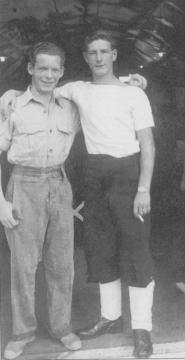
Leading Seaman Gordon Cleaver (on the right) with A C Knight who was killed in the 1953 action
